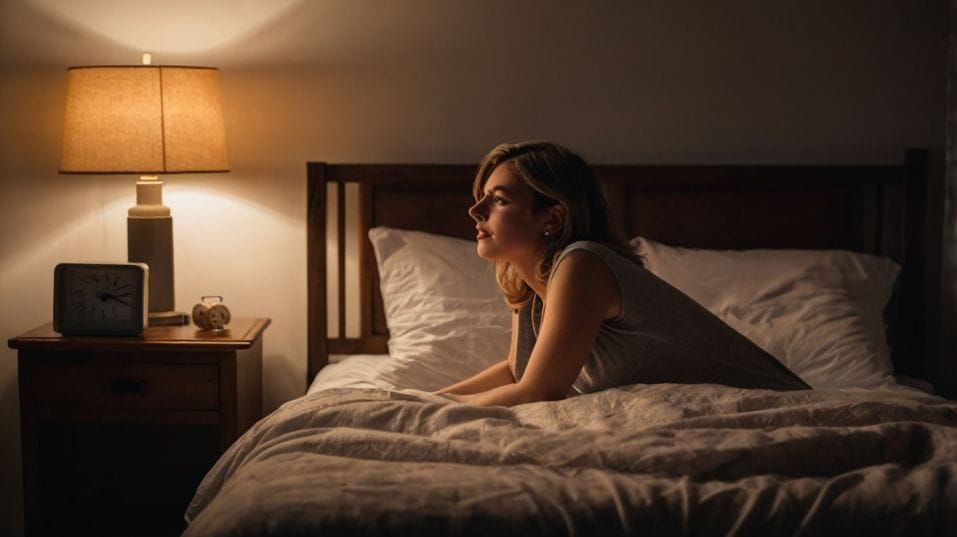What Is Sleep Onset Insomnia—and How Is It Treated?
Struggling to fall asleep? Discover the science of sleep onset insomnia and proven natural fixes to help you drift off faster—tonight.

Why can you feel bone-tired but still lie awake for hours? If your brain refuses to switch off at night, sleep onset insomnia could be the culprit—and the good news is, it’s highly fixable.
By learning how your body’s sleep systems work, and making a few targeted changes, you can train your brain to ease into rest naturally. No gimmicks, no overhaul—just smarter habits that help you fall asleep faster and wake up sharper.
What Exactly Is Sleep Onset Insomnia?
Sleep onset insomnia means you can’t fall asleep within a normal time window—even when you want to.
Most people drift off within 10 to 20 minutes after hitting the pillow. If it regularly takes you 30 minutes, 45 minutes, or even longer, your body’s sleep systems are out of sync.
This isn’t just about tossing and turning once in a while. It’s a chronic pattern where the mind stays too alert or the body just isn’t primed for sleep when it should be.
And here’s the kicker: even if you eventually get enough total sleep, the delay itself messes with your recovery, your energy the next day, and your ability to stick to a healthy routine.

Why You Can’t Fall Asleep—Even When You’re Tired
Sleep isn’t just a switch—it’s a rhythm. Two main systems drive your sleep:
- Sleep Drive (homeostatic sleep pressure): The longer you're awake, the more pressure builds for sleep.
- Circadian Rhythm: Your body clock that governs when you feel alert and when you feel sleepy.
When these two systems are aligned, you fall asleep easily. When they’re off, your brain sends mixed signals. You might feel tired but wired, physically exhausted but mentally alert. Sound familiar?
This disconnect can happen for a lot of reasons:
- Late caffeine or alcohol use (even 6–8 hours before bed)
- Too much artificial light at night (phones, laptops, overhead LEDs)
- Inconsistent sleep and wake times
- Low daytime activity or poor sunlight exposure
- Mental overdrive from stress, anxiety, or nonstop stimulation
And then there’s the paradox: the more you try to fall asleep, the harder it gets. Sleep isn’t something you force—it’s something you allow.
That’s why the real solution starts with removing the friction between you and your body’s natural rhythms.
Building a Sleep-Onset-Friendly Routine
Fixing sleep onset insomnia doesn’t mean overhauling your life. But it does mean making deliberate changes that support your body’s sleep drive and circadian cues. You’re training your system to recognize, “It’s time to shut down now.”
Anchor Your Wake Time—No Matter What
The time you wake up is more important than when you go to bed. Why? Because your circadian rhythm is reset by morning light.
Get out of bed at the same time every day (yes, even weekends), and expose your eyes to natural sunlight within 30–60 minutes. This strengthens your internal clock and helps melatonin release on time that night.
If you sleep in to “make up for lost sleep,” you’re actually making things worse. Consistency is king.
Wind Down with Intention
Your brain needs a clear signal that the day is ending. That means at least 45–60 minutes of intentional decompression. Shut down work. Turn off harsh lights. Put your phone away or use a blue light filter if you must use screens.
Switch to low-stimulation activities: stretching, reading, ambient music, even light chores. The key isn’t to feel bored—it’s to give your brain permission to slow down.
Avoid mentally activating stuff. Scrolling social media or watching intense shows delays melatonin and keeps your nervous system in high gear.
Respect Your Sleep Pressure
Build stronger sleep pressure throughout the day:
- Get sunlight early and often
- Move your body regularly—even a short walk makes a difference
- Avoid naps, especially after 2 PM
- Limit caffeine after noon
By the time you’re in bed, your body should want to sleep. Don’t rob it of that natural buildup.
Retrain Your Brain’s Sleep Associations
If you spend too much time in bed not sleeping, your brain starts associating your bed with wakefulness. Break that link. Only get in bed when you’re actually sleepy.
Can’t fall asleep after 20–30 minutes? Get up. Leave the room. Do something quiet and non-stimulating until you feel drowsy again. Then try again. It sounds counterintuitive, but it teaches your brain: bed = sleep, not stress.
Use Behavioral Sleep Therapy When Needed
Cognitive Behavioral Therapy for Insomnia (CBT-I) is the gold standard treatment for chronic sleep onset issues.
It helps you identify unhelpful thought patterns and behaviors around sleep and replace them with ones that support fast, natural sleep.
It’s not “therapy” in the emotional sense—it’s practical, skills-based, and backed by decades of research. Many people see results in just a few weeks. You can work with a sleep coach, find digital programs, or explore self-guided CBT-I workbooks.
Supplements and Quick Fixes—Do They Help?
Melatonin can be helpful if your circadian rhythm is off—like during jet lag or major schedule shifts. But it’s not a knockout pill.
Small doses (0.3–1mg) taken 1–2 hours before bed work best. Skip mega-doses; they don’t help more, and may confuse your system.
Magnesium, L-theanine, and glycine can promote relaxation, but they’re not magic. Think of supplements as supportive tools—not substitutes for building the right habits.
Final Thoughts
Sleep onset insomnia isn’t just about being “bad at sleeping.” It’s about retraining your body and brain to get back into rhythm.
Once you do, you unlock more than just better rest. You unlock sharper focus, faster recovery, stable energy, and a body that actually wants to sleep at night.
So don’t wait for exhaustion to fix the problem for you. Start tonight. Set a firm wake-up time. Step into the sun early. Power down your screens with purpose.
Build a wind-down window that actually feels good. The more you respect your body’s rhythm, the faster sleep will come. Better sleep isn’t a mystery. It’s a system. And now, you’ve got the blueprint.




